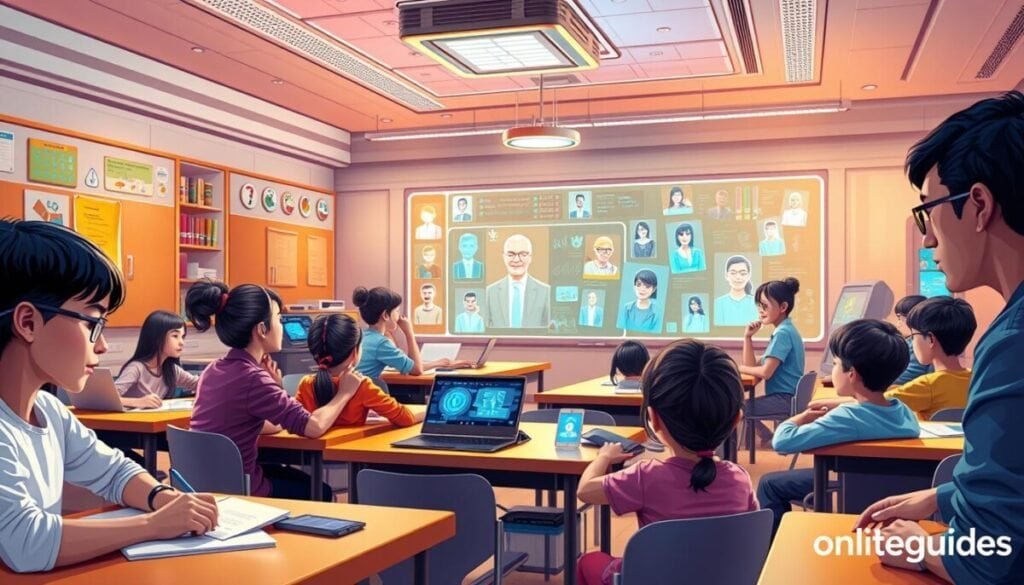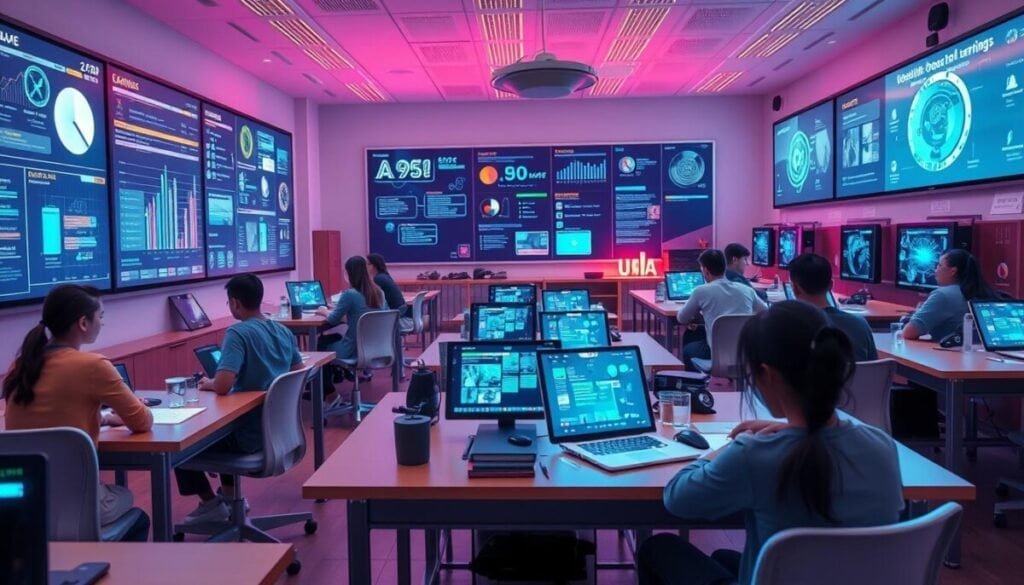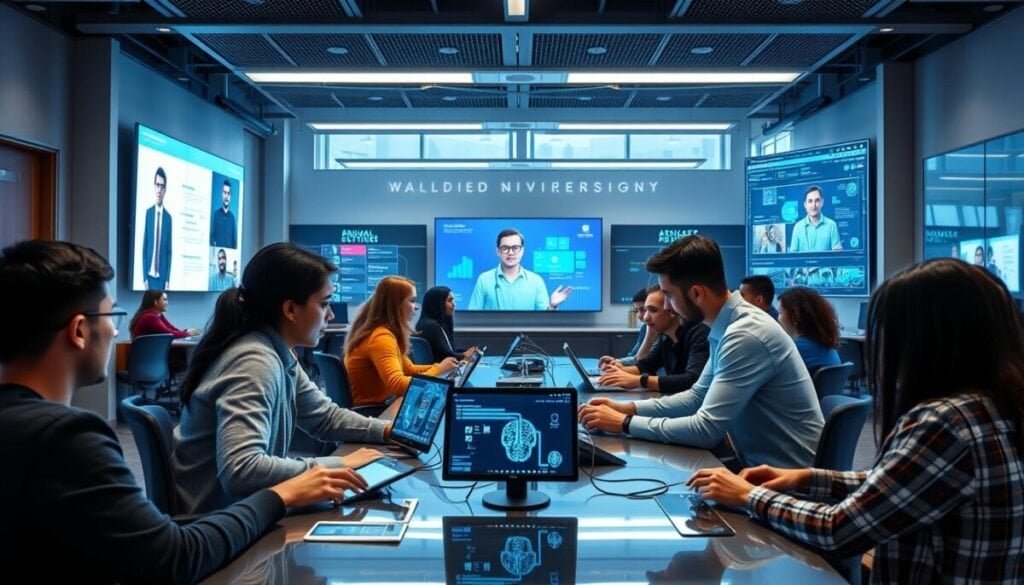Are we on the brink of an educational revolution? AI-powered tutoring systems are changing how we learn. They offer personalized experiences that fit each student’s needs. These systems are real and are changing education now.
EdTech innovations are growing fast, making quality education available to all. AI tutors help students worldwide, offering support any time. At Georgia Tech and Walden University, AI tutors like Jill Watson and Julian are making a big impact.
The future of learning looks bright with AI leading the way. These systems use lots of data to make lessons just right for each student. They adjust the pace and difficulty as they go, focusing on how each student learns best.
We’ll dive into how AI tutoring systems are changing education. We’ll see how they’ve evolved, what they can do now, and their future in learning. Get ready to see how AI is changing how we learn and teach.
Key Takeaways
- AI-powered tutoring systems offer personalized learning experiences
- These systems provide real-time feedback and 24/7 availability
- AI tutors like Jill Watson and Julian are pioneering in higher education
- Intelligent Tutoring Systems can break geographical barriers in education
- The future of EdTech focuses on democratizing quality education
- AI in education supports lifelong learning and individual student needs
The Evolution of Educational Technology
Educational technology has changed a lot. Now, Educational AI and Machine Learning in Education lead the way. We’ve moved from simple digital tools to smart AI systems that change how we learn.
From Clippy to Smart Compose: AI’s Journey in Assistance
Do you remember Microsoft’s Clippy? It was the start of AI helpers. Now, we have Google’s Smart Compose. These AI tools give writing tips in real time, helping students and teachers.
The Rise of AI in Higher Education
AI and machine learning are big in higher education now. Schools use AI to make tasks easier, tailor learning, and give insights for better choices.
Early AI Tutors: Jill Watson and Beyond
Georgia Tech’s Jill Watson, an AI teacher, was a big step in 2016. It showed AI’s role in education. At first, AI tutors just answered simple questions. But now, they can offer deeper help.
The growth of EdTech with AI is fast. AI tutoring is getting smarter. This change will make learning better, more fun, and available to everyone.
Understanding AI-Powered Tutoring Systems
AI-powered tutoring systems are changing education. They use new technology for personalized learning. This makes learning more accessible and effective for everyone. These AI-powered tutoring systems can analyze the learning styles and preferences of individual students, allowing for customized lesson plans and study materials. Additionally, they can provide real-time feedback and adapt their teaching methods as the student progresses. Some of the top SQL tools utilized in these systems include Microsoft SQL Server, Oracle Database, and MySQL. These tools help students master database management and querying, providing a practical and valuable skill set for their future careers.
These systems learn about each student’s knowledge and needs. They track progress and give feedback. This helps students learn better and stay interested.

Duolingo and Coursera are examples of AI in education. They show how AI can change learning and teaching.
| Feature | Benefit |
|---|---|
| Personalized Learning Paths | Tailored instruction based on individual needs |
| Real-time Feedback | Immediate guidance for improved understanding |
| 24/7 Availability | Learning beyond time constraints |
| Adaptive Content | Material adjusts to student performance |
AI tutoring systems are changing education’s future. They offer personalized support and use data to help students. As we move towards personalized learning, these systems will be key in changing classrooms and online learning. These AI tutoring systems also have the capability to track students’ progress and adapt their teaching methods accordingly. With the help of time tracking applications, these systems can analyze how much time students are spending on different tasks and adjust the learning materials to target areas where students may be struggling. This level of personalized support and data analysis has the potential to greatly improve student outcomes and shape the future of education.
AI-Powered Tutoring Systems: The Future of Personalized Learning
AI tutoring systems are changing education. They give each student a learning plan that fits them. This makes learning more efficient and effective.
Adaptive Learning: Tailoring Education to Individual Needs
Adaptive learning technology changes to fit each student’s learning style. For example, Khan Academy is a leader in this area. It has helped over 160 million users worldwide, with 54 million in the U.S.
Their AI tool, Khanmigo, is being tested by 28,000 teachers and students.

Real-Time Feedback and Assessment
AI tutors give feedback right away. This helps students learn from mistakes quickly. Students using Khan Academy’s MAP Accelerator saw big gains.
They grew academically by 26%-38%. Those who used it weekly scored 22 points higher on math tests.
24/7 Availability: Learning Beyond Time Constraints
AI systems are always available for learning. This breaks down old time limits. It’s great for parents and students who want flexible learning.
| AI Tutoring Feature | Benefit | Impact |
|---|---|---|
| Adaptive Learning | Personalized Learning Paths | 26%-38% Increase in Academic Growth |
| Real-Time Feedback | Immediate Error Correction | 22-Point Increase in Math Scores |
| 24/7 Availability | Flexible Learning Schedule | Serving 900,000+ Students Across 400+ Communities |
Case Study: Julian at Walden University
Walden University teamed up with Google Cloud to create Julian. This AI-Assisted Tutoring system is a big step forward in education. It offers learning experiences that fit each student’s needs.
Google’s Role in Julian’s Development
Google Cloud played a key role in making Julian. They worked together to make an AI tutor that understands and adapts to students. This shows how big tech can change education.

Unscripted AI Tutoring
Julian is special because it learns and changes with each use. It helps students in many ways, like in sociology and early childhood studies. It helps students know more and do better on assignments.
API-Driven Design for Adaptability
Julian’s design lets it grow and change. It can work with new tech like virtual reality. This makes it a leader in AI-Assisted Tutoring and EdTech.
| Feature | Benefit |
|---|---|
| 24/7 Availability | Round-the-clock student support |
| Personalized Learning | Tailored guidance for each student |
| Adaptive Responses | Continuous improvement based on interactions |
| API Integration | Potential for future tech integrations |
Julian at Walden University shows the future of AI in learning. It’s a big step towards better, more accessible education. It changes how we learn in the digital world.
Georgia Tech’s Contribution to AI Tutoring
Georgia Tech is leading the way in AI for education. In 2016, they introduced Jill Watson, an AI teaching assistant made with IBM. This was a big step in EdTech, opening doors for better Intelligent Tutoring Systems.
The university is all in on AI for learning. They set up the National AI Institute for Adult Learning and Online Education (AI-ALOE). This is thanks to a $20 million grant from the National Science Foundation. AI-ALOE works on making AI tutors that can reach more people.

Georgia Tech’s AI tools have learned from over 40,000 questions. They aim to grow to 4 million questions. This will help make tutoring systems smarter and more helpful.
One exciting project is Agent Smith. It can make a Jill Watson AI tutor for different courses in just five hours. This could change how AI tutors are used in schools.
| AI Tool | Function | Impact |
|---|---|---|
| Jill Watson | AI Teaching Assistant | Pioneered AI in education |
| AI-ALOE | Research Institute | Advancing AI tutoring systems |
| Agent Smith | AI Tutor Replicator | Rapid AI tutor deployment |
Georgia Tech does more than just make AI tools. They also do research. They’ve made 17 contributions to the ACM Learning @ Scale 2024 Conference. Their work helps make sure AI is used right in schools, shaping the future of learning worldwide.
The National AI Institute for Adult Learning and Online Education (AI-ALOE)
AI-ALOE is changing Adult Learning and Online Education. It focuses on adult learners in the U.S. Millions need to learn new skills. AI-ALOE uses AI tutors when human ones are not around.
Addressing the Needs of Adult Learners
AI-ALOE started using AI tutors in spring 2022. Schools and courses keep growing. They cover subjects like general education and medical terminology.
Scaling AI Tutors with Agent Smith
The institute wants to make AI tutors available worldwide. Agent Smith is a key part of this plan. It can create many AI tutors quickly for different classes.
The Vision of Global AI Tutor Accessibility
AI-ALOE wants everyone to have access to smart tutoring. They’re working with Georgia Tech to make virtual teaching assistants. This fits with the growing use of AI in schools.
| AI Tutor | Function | Deployment |
|---|---|---|
| Jill Watson | Answering student questions | 40+ online classes, 12,000+ students |
| iTELL | Interactive text conversion, automatic scoring | Various TCSG colleges |
| SMART | Formative assessment feedback | TCSG classes since 2022 |
| Apprentice | Personalized math learning feedback | Select TCSG colleges |
| VERA | Virtual ecology lab experiments | TCSG environmental science courses |
Overcoming Challenges in AI Tutoring Implementation
AI in schools faces big challenges. It’s hard to get teachers to use it and to make learning data-driven. Many teachers don’t know how AI works in classrooms.
Getting data for AI is tough. Schools find it hard to collect and keep the right data. This makes AI’s predictions and learning tips less accurate.
Privacy is a big worry with AI in schools. It’s important to handle student data carefully. Using data protection methods helps keep students safe while still helping AI learn.
Teachers need training to use AI well. They must learn how to use AI for better teaching and learning. They also need ongoing help to keep getting better at using AI.
| Challenge | Solution |
|---|---|
| Lack of AI awareness | Enhanced educator training programs |
| Data collection difficulties | Improved data management systems |
| Privacy concerns | Data anonymization and encryption |
| Teacher preparation | Ongoing support and resources |
Even with challenges, AI has a lot to offer. It can learn about students’ strengths and weaknesses. This helps make learning more fun and effective for everyone.
Data-Driven Insights and Analytics in Education
We’re seeing a big change in education thanks to data-driven tools. These tools help us understand and support students better. AI is leading this change, giving us insights we never had before.
Predictive Analytics for Proactive Learning Support
Predictive learning analytics are making a big difference. They can predict how well students will do and find those who might struggle. For example, Coursera uses AI to suggest courses based on student data.
This helps teachers help students before they fall behind. It’s a proactive way to support students.
Identifying Common Struggles and Adjusting Teaching Methods
AI systems are great at finding patterns in student data. They help teachers see where students often struggle. This lets teachers improve their teaching.
Intelligent Tutoring Systems (ITS) are like personal tutors. They give help and explanations right away. This makes sure each student gets the help they need.
Early Intervention Strategies
Helping students early is crucial for their success. AI analytics can spot early signs of trouble. This lets teachers help quickly.
Adaptive learning platforms adjust to how students do. They make sure students don’t get stuck. This helps students do well in the long run.



